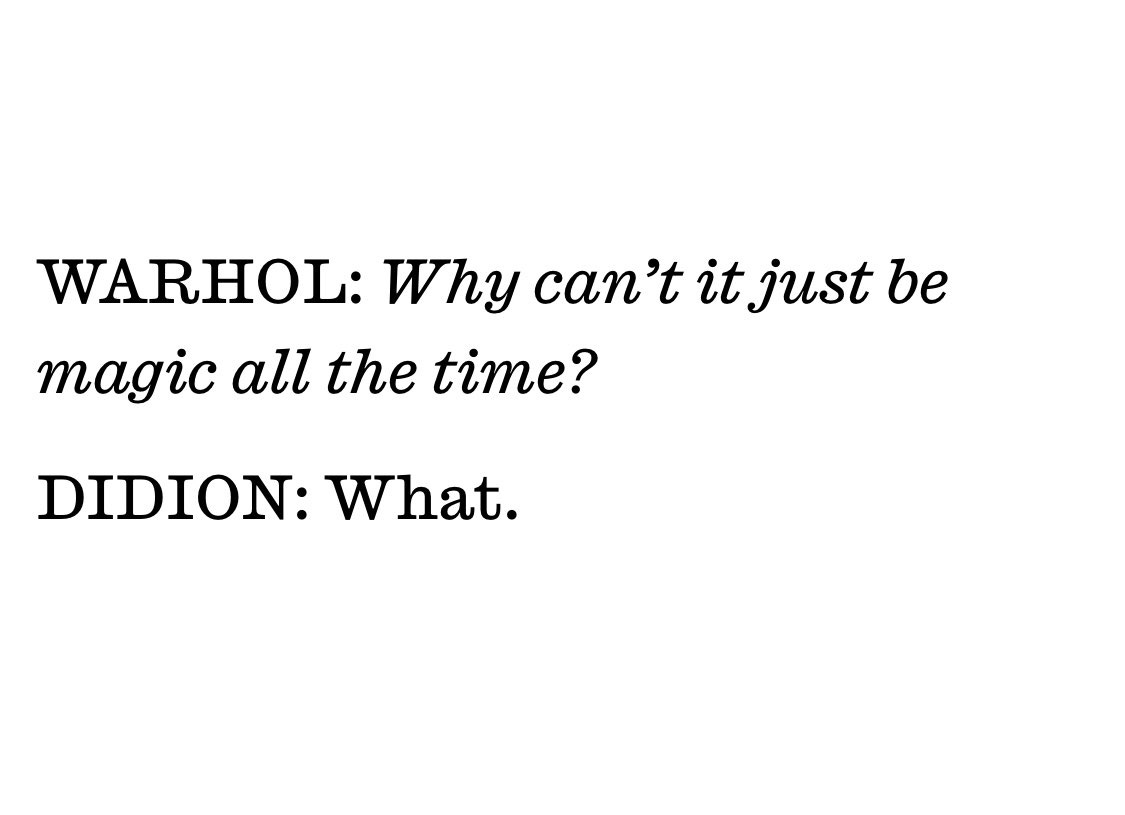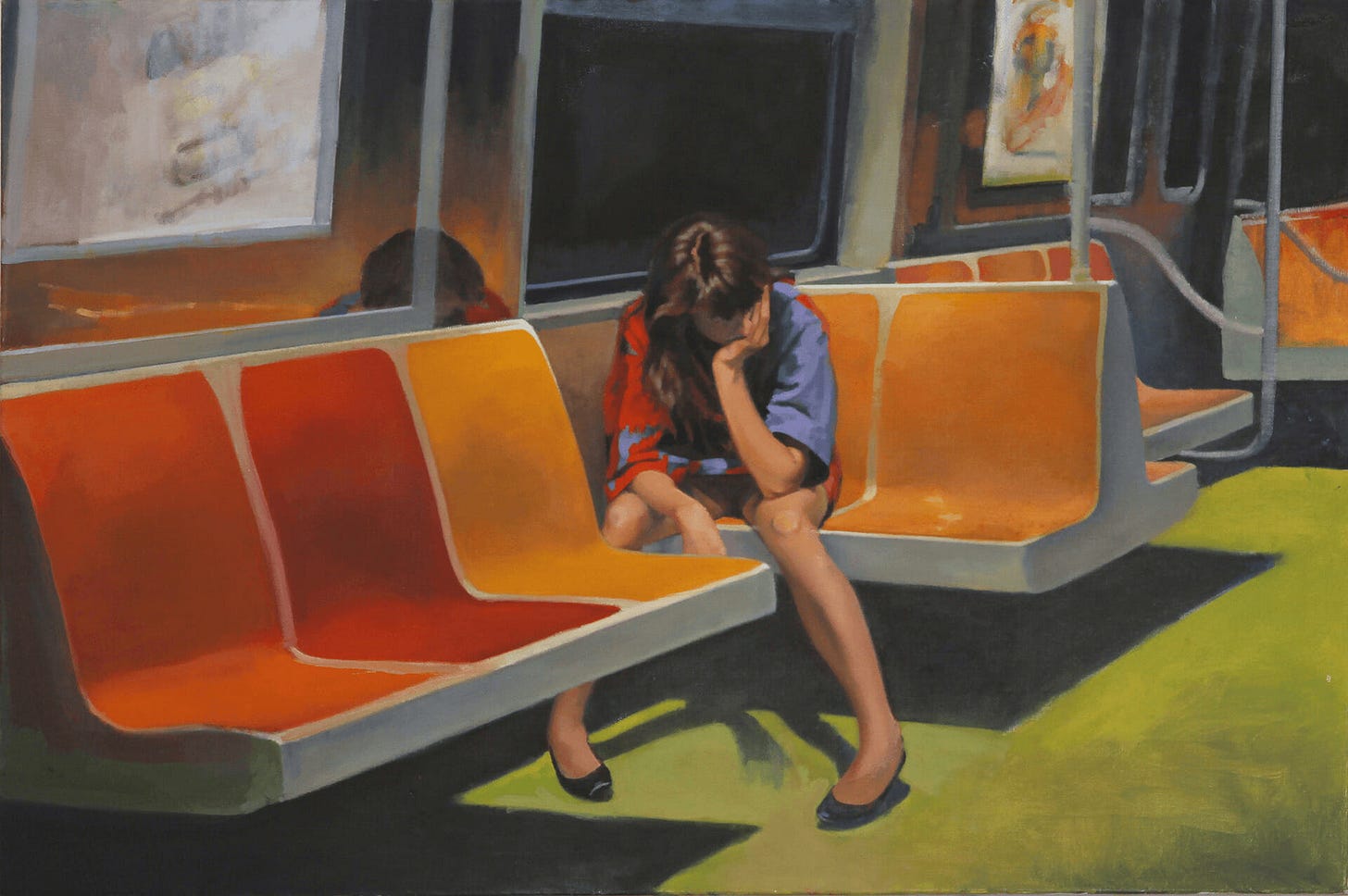
In April, I readied for my life to change. Instead, the sun came out. Work got busy. I didn’t see my friends much, didn’t read many books.
When I reflect on the month to try and make narrative sense of it (because I must have Narrative), I struggle. I feel strongly that if April with all its events and non-events did not, my present would still be the same. This is objectively untrue, a few important things occurred. It was my parents’ first time visiting me in London, their first ever trip to Europe. I turned in a revision of my novel, now officially a step closer to its final form. I had a “good” month, but it feels like a “bad” month, and I’m trying to understand why.
I think of a lyric by The 1975: “I bet you thought your life would change, but you’re sat on a train again.” You work towards or look forward to something, it happens, you’re sat on the train again. Sometimes I think my real life is still waiting to happen.
I know there’s a causal relationship between my fixation on narrative and my ambivalence, even disappointment, towards reality. What I mean by narrative: I want events in my life to be meaningful, to be worthy maybe not on their own but against a broader unfurling story, to interact with each other in clear and logical ways that build into something bigger, big enough to become small again, just one sentence, a chapter title that confirms the importance of time past. The idea—the reality—that time could pass and nothing could come of it, that sometimes days end without offering anything remarkable, no rare bird or strange revealing conversation or burst of great feeling, makes me uncomfortable. Things are boring and forgettable and don’t often make sense. Life can’t be exciting all the time, I know. But also, why can’t it be?
I am sorry to say that on the Warhol/Didion spectrum pictured above, I fall entirely on both sides. When I first came upon this hilarious “exchange” I felt a stronger affinity towards Didion’s answer, her cool and baffled seriousness against the inanity of Warhol’s question. I relate to this attitude of temperance and realism; a big part of me believes that life is a challenge in discipline, and if you don’t stay focused, you fall off track. Behind every act of magic is the trick, and I’d sooner habituate myself with trick-making than magic-chasing.
AND YET. And yet. I am known to lose myself slightly at the sight of a squirrel. I will read a paragraph that surprises me and feel completely and giddily awake, like Joseph Gordon-Levitt skipping through the park after sleeping with Zoe Deschanel in 500 Days of Summer awake. A very good conversation over dinner will momentarily transform the way I feel about myself, my life, its potential for ecstasy and connection, and I will feel sorry for those who don’t believe it can be magic all the time, I will believe that magic is real, and everywhere, and maybe there is no trick, maybe life can be this delicious if I every day I come upon a squirrel or read a good book (maybe that’s why April was a nothing month, I only read two books, and one of them I didn’t like) or sit at a table with two to four friends where the glasses are sweating but not yet empty and there’s no way the evening will ever, ever end, there’s no way I’ll lie awake in a dark room staring at the ceiling thinking about the kind of weird things I said and the fact that one day I’ll die with so much still left to do.
The problem with April is that I wanted it to be magic all the time and instead it was What. The events had so much narrative potential. My parents came. We haven’t properly traveled together since I was a teenager. I secretly believed it would transform everything: our relationship, how they saw me, how I saw them, the way we spoke with each other, opening a new chapter of relating and seeing. The reality was that even if such a definitive change was possible in such a short amount of time, it would transpire through the feeling and language of the typical. We had good days, we had okay days. We discussed the cat, made new jokes, went on long walks, and struggled to understand each other. Sometimes I was sensitive and irritable, which I swore to myself to not be, other times I felt misunderstood, and sad. Two weeks passed, I got the stomach flu, they left.
Another thing: I turned in my first round of revisions of my novel (at least the tenth in its life cycle) to my editor. I had expectations of the process: it should offer thrilling breakthroughs; it should possess my thoughts and day job the way writing and editing the book did; it should be challenging, but ultimately unthreatening.
How it actually felt: laggy, nearly mathematical, enlivened occasionally by a rush of inspiration but mostly failing to consume my attention unless I made a great effort to Lock In. How could I have felt apathetic about my own novel? What does that mean, like, maybe I actually hate writing, and I’ll never write another book? I felt like I’d been thwarted, done some great narrative injustice—why can’t it be magic all the time!!!—instead of having a simple case of writer’s block.
In the end, I made it through, I turned in a draft that I’m actually somehow satisfied with. Yet hitting Send gave me no satisfaction at all. For me, in order for something to feel like an accomplishment, it must carry narrative significance, it should tell a good story. Otherwise, it’s just a task. Completing a revision through the same sense of duty that obliges me to fulfill my job’s 3-day in-office requirement is not a good story. I think of those consecutive weeks of rote studying I used to do at university for midterms and finals, whole months slipped away. That’s the same feeling I get when I look back on the revising process. I know it happened, but I can’t remember doing it. In the words of Lorde: what was that?
I don’t think my perspective is unique. I think a lot of people live their lives, whether consciously or not, in pursuit of narrative, and are then either gratified or dissatisfied by the result. Do it for the plot, we tell ourselves stories in order to live, you know what I mean. I guess what’s interesting or sometimes intimidating is that our idea of a good story can depend so much on broader, internalized narratives of worthiness: what an interesting life looks like, the right way to spend a day, how an adult relationship with your parents should be, which experiences are meaningful and which are simply filler. My feeling that April was a bad month is a result of it falling short of my expectations, the story version where I emerged a more ideal daughter and more actualized writer—a more actualized person in general.
I don’t want to live for the story, but how can I not, when writing and reading stories is the most basic instinct I have? How can I separate my expectations and narratives surrounding how an experience should unfold with the reality of it, when the unfolding only happens once, but can be narrativized in different ways forever? How do I accept hat actually, yes, my life can change in myriad and often extraordinary ways, but I’ll still be sat on the train again, debating whether or not the vaguely old person in front of me would be offended if I offered them my seat, then kicking myself for failing to act when they take the next available one?
That’s the thing. At the end of the day, I’m me, and the experience of being me offers the same thrills and bores and disappointments as ever.1 My life will change, but it will still be the same, despite the narratives I spin around it.
Whatever, April was just a filler month. May is when my life will finally begin.
Thanks for reading, as always. And, as always, let me know how you feel.
I realized after writing this piece that it is essentially SNL’s “Romano Tours” skit, which is humbling.








As someone who has - for most of her life - aspired to curate a self that would fall on the What end of the Warhol/Didion spectrum, I sometimes feel I have preemptively forgone the Why can’t it just be magic all the time?
But, as you say, regardless of aspirations we will all find ourselves back on the train. And maybe such an inevitability is comforting.
Hi Scamp. Another powerful essay. I enjoyed reading it even though it drew out somewhat sad feelings. As I'm no longer young, in contrast to you and the majority of your readers, your essay may have resonated differently with me than with others. I look forward to reading your future essays. Speaking of squirrels, we have a little red squirrel that raids the bird feeder, but I love the little rascal, smiling at him as he hangs upside down stealing sunflower seeds.